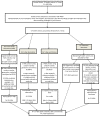Task-shifting and prioritization: a situational analysis examining the role and experiences of community health workers in Malawi
- PMID: 24885454
- PMCID: PMC4014628
- DOI: 10.1186/1478-4491-12-24
Task-shifting and prioritization: a situational analysis examining the role and experiences of community health workers in Malawi
Abstract
Background: As low- and middle-income countries face continued shortages of human resources for health and the double burden of infectious and chronic diseases, there is renewed international interest in the potential for community health workers to assume a growing role in strengthening health systems. A growing list of tasks, some of them complex, is being shifted to community health workers' job descriptions. Health Surveillance Assistants (HSAs) - as the community health worker cadre in Malawi is known - play a vital role in providing essential health services and connecting the community with the formal health care sector. The objective of this study was to understand the performed versus documented roles of the HSAs, to examine how tasks were prioritized, and to understand HSAs' perspectives on their roles and responsibilities.
Methods: A situational analysis of the HSA cadre and its contribution to the delivery of health services in Zomba district, Malawi was conducted. Focus groups and interviews were conducted with 70 HSAs. Observations of three HSAs performing duties and work diaries from five HSAs were collected. Lastly, six policy-maker and seven HSA supervisor interviews and a document review were used to further understand the cadre's role and to triangulate collected data.
Results: HSAs performed a variety of tasks in addition to those outlined in the job description resulting in issues of overloading, specialization and competing demands existing in the context of task-shifting and prioritization. Not all HSAs were resistant to the expansion of their role despite role confusion and HSAs feeling they lacked adequate training, remuneration and supervision. HSAs also said that increasing workload was making completing their primary duties challenging. Considerations for policy-makers include the division of roles of HSAs in prevention versus curative care; community versus centre-based activities; and the potential specialization of HSAs.
Conclusion: This study provides insights into HSAs' perceptions of their work, their expanding role and their willingness to change the scope of their practice. There are clear decision points for policy-makers regarding future direction in policy and planning in order to maximize the cadre's effectiveness in addressing the country's health priorities.
Figures
Similar articles
-
Health surveillance assistants as intermediates between the community and health sector in Malawi: exploring how relationships influence performance.BMC Health Serv Res. 2016 May 3;16:164. doi: 10.1186/s12913-016-1402-x. BMC Health Serv Res. 2016. PMID: 27142944 Free PMC article.
-
Enabling and hindering factors of health surveillance assistants' roles in the provision of contraceptive services in Mangochi, Malawi.Reprod Health. 2020 Apr 20;17(1):57. doi: 10.1186/s12978-020-0906-3. Reprod Health. 2020. PMID: 32312279 Free PMC article.
-
Motivation and job satisfaction of health surveillance assistants in Mwanza, Malawi: an explorative study.Malawi Med J. 2013 Mar;25(1):5-11. Malawi Med J. 2013. PMID: 23717748 Free PMC article.
-
Labour conditions in dual-cadre community health worker programmes: a systematic review.Lancet Glob Health. 2023 Oct;11(10):e1598-e1608. doi: 10.1016/S2214-109X(23)00357-1. Lancet Glob Health. 2023. PMID: 37734803
-
Healthcare Professional Shortage and Task-Shifting to Prevent Cardiovascular Disease: Implications for Low- and Middle-Income Countries.Curr Cardiol Rep. 2015 Dec;17(12):115. doi: 10.1007/s11886-015-0672-y. Curr Cardiol Rep. 2015. PMID: 26482758 Review.
Cited by
-
Evaluating Vertical Malaria Community Health Worker Programs as Malaria Declines: Learning From Program Evaluations in Honduras and Lao PDR.Glob Health Sci Pract. 2021 Mar 15;9(Suppl 1):S98-S110. doi: 10.9745/GHSP-D-20-00379. Print 2021 Mar 15. Glob Health Sci Pract. 2021. PMID: 33727323 Free PMC article.
-
Health surveillance assistants as intermediates between the community and health sector in Malawi: exploring how relationships influence performance.BMC Health Serv Res. 2016 May 3;16:164. doi: 10.1186/s12913-016-1402-x. BMC Health Serv Res. 2016. PMID: 27142944 Free PMC article.
-
Trends in task shifting in HIV treatment in Africa: Effectiveness, challenges and acceptability to the health professions.Afr J Prim Health Care Fam Med. 2015 Jul 30;7(1):807. doi: 10.4102/phcfm.v7i1.807. Afr J Prim Health Care Fam Med. 2015. PMID: 26245622 Free PMC article. Review.
-
"Because Even the Person Living With HIV/AIDS Might Need to Make Babies" - Perspectives on the Drivers of Feasibility and Acceptability of an Integrated Community Health Worker Model in Iringa, Tanzania.Int J Health Policy Manag. 2019 Sep 1;8(9):538-549. doi: 10.15171/ijhpm.2019.38. Int J Health Policy Manag. 2019. PMID: 31657176 Free PMC article.
-
"Mothers will be lucky if utmost receive a single scheduled postnatal home visit": An exploratory qualitative study, Northern Ethiopia.PLoS One. 2022 Mar 30;17(3):e0265301. doi: 10.1371/journal.pone.0265301. eCollection 2022. PLoS One. 2022. PMID: 35353832 Free PMC article.
References
-
- Global Health Workforce Alliance and WHO. Global Experience of Community Health Workers for Delivery of Health Related Millennium Development Goals: A Systematic Review, Country Case Studies, and Recommendations for Integration into National Health Systems. Geneva: World Health Organization; 2010.
-
- The Earth Institute. One Million Community Health Workers: Technical Task Force Report. Columbia: Columbia University; 2011.
-
- WHO. Country Health Profile: Malawi. Geneva: World Health Organisation; 2013.
-
- WHO. Task Shifting: Rational Redistribution of Tasks Among Health Workforce Teams: Global Recommendations and Guidelines. Geneva: World Health Organisation; 2008.
-
- Christopher JB, Le May A, Lewin S, Ross DA. Thirty years after Alma-Ata: a systematic review of the impact of community health workers delivering curative interventions against malaria, pneumonia and diarrhoea on child mortality and morbidity in sub-Saharan Africa. Hum Resour Health. 2011;9(1):27. doi: 10.1186/1478-4491-9-27. - DOI - PMC - PubMed
Publication types
MeSH terms
LinkOut - more resources
Full Text Sources
Other Literature Sources
Research Materials


